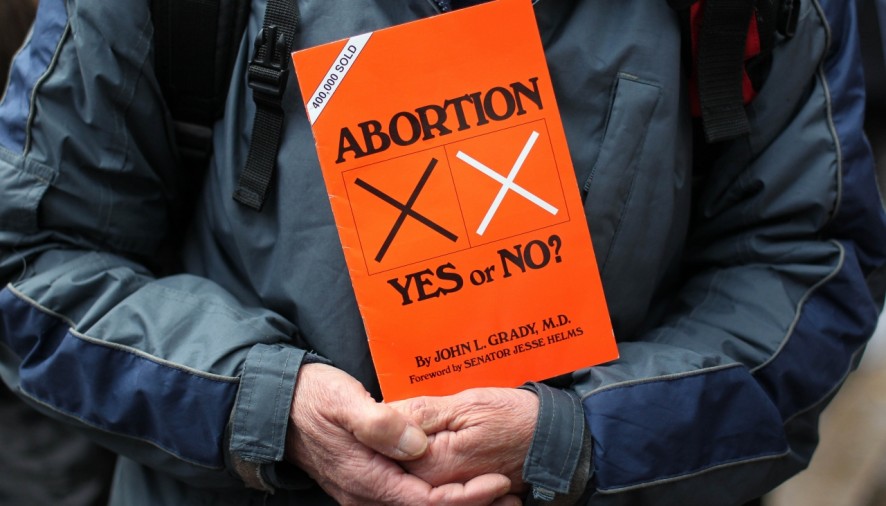Yes:
In 2014 an Oxford University debate about abortion was shut down because the two speakers were both men. This of course, set the hard core feminists off, saying that only women should be allowed to participate in debates on abortion, which is, quite frankly, ridiculous. While the panel should never have been men only, men should still be able to debate about abortion.
Like it or not, a man has contributed to 50% of your DNA, the rest coming from your mother (three-person babies discounted for simplicity). In fact, a recent study suggests that of all the DNA you “express” (of two equivalent genes, one from each parent, only one becomes an observable characteristic, such as eye colour), 60% of this DNA is from the father. It might be the woman who undergoes pregnancy, but that is beyond the control of the man, who, in the same way that I did not choose to be born with a uterus, did not choose to be born with a penis. A man therefore has a significant attachment to his offspring, and will have his own thoughts on the subject of abortion, and these should not be discounted.
I was also under the impression that in the 21st century, men and women were not to be assigned gender specific roles such as the men earning money, while the women cook and clean. Feminists continue to fight against this perception, but surely telling a man he cannot participate in any discussion simply because of his genitals immediately contradicts this stance. I, for one, do not want female dominance, but equality for both genders.
Another aspect of this delicate matter is that gynaecologists have attended university for five years, and may have practised medicine for many more. While a woman may be the one undergoing physical changes during pregnancy and abortion, both male and female gynaecologists have extensive knowledge of the workings of an immensely complicated system controlled by a cocktail of hormones. Surely debates on abortion should include someone with this superior knowledge, to destroy any pseudo-science based arguments such as proposed links to cancer, and also to maintain the safety of the patients’ health, irrespective of their gender. Of course, it could be said that there are plenty of female gynaecologists out there, and that perhaps Oxford University should have included one of these in the discussion panel. I think that the sexism here can be found in the perception of women in science, and not in the debate upon abortions.
For everyone who calls themselves a feminist, men included, I say this; women have equal rights to men, and that means that men have equal rights to women. Equal wages, equal job opportunities in every industry, equal opportunities for education, equal rights not to be sexually objectified, and equal rights when it comes to discussing a sensitive topic like abortion.
Emma Steer
No:
In this country’s political system, where 459 male MP’s outnumber the 191 female, are the interests of women being drowned out? The fact that Parliament today continues to be dominated by a male led agenda, it begs the question: do men really have the right to legislate over the reproductive rights of women? This is not to say that just because you are a woman you agree with abortion, but the debate itself is something that is linked intrinsically to female experience.
My view on abortion itself in this case, is irrelevant. However, the experience of ultimately deciding what to do regarding your pregnancy, is something only the person who is pregnant can do. Whilst the political make up of this country may not lend itself to the prioritisation of women’s rights, it is important to acknowledge that this is a scenario which only a person with a womb will experience. The trauma and isolation that come with it show that it is not a frivolous decision making process. Can cis men ever really and truly empathise with the nature of this experience? It is refreshing how more and more men are becoming proactive and involved with the process of deciding to and having a child, but when it comes to the situation that leads to having an abortion, this is ultimately a decision that a woman will make alone. If men get more involved in the debate on abortion, it encroaches on the space that should be only occupied by women.
Sometimes, adopting a separatist approach to an issue can be counterproductive, as has been seen in the past with various Civil Rights struggles. However, in this case the public abortion debate should be a safe space for women to discuss and debate the physical and moral implications of undergoing a termination.
With male dominated spheres legislating in so many areas of women’s lives, this is an area which women should be able to confidently occupy. The Catholic Church for example, is a case in point of male led interests deciding the legal and moral implications of actions that affect women. There are only seven countries in the world which have criminalised abortion, most of them are in Latin America and the Caribbean, where the Catholic Church wields great power. Closer to home in Ireland, women face up to fourteen years in jail for trying to assert the rights to their own reproductive system. It has been going on long enough that men have been involved in the creating of laws that criminalise and stigmatise women for simply trying to take control of their own bodies.
The termination of a pregnancy is something that ultimately concerns only the woman in the situation. Public forums debating abortion therefore, should be comprised of only the people that will face this situation. The emotional and physical consequences that come with a termination of pregnancy are long lasting and far reaching, therefore it is only those that have or may face this experience, that should be debating the issue.
Katie Rengal
Image courtesy of Getty

